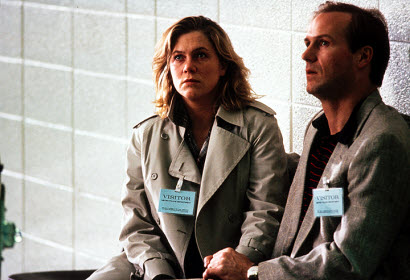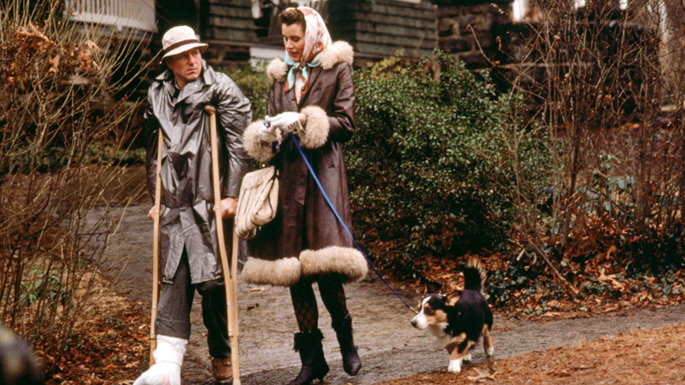From the Chicago Reader (January 13, 1989). — J.R.
THE ACCIDENTAL TOURIST
** (Worth seeing)
Directed by Lawrence Kasdan
Written by Frank Galati and Kasdan
With William Hurt, Kathleen Turner, Geena Davis, Amy Wright, David Ogden Stiers, Ed Begley Jr., and Bill Pullman.
Why is the inability to feel such a popular and respected subject in contemporary American movies? William Hurt makes his way through most of The Accidental Tourist, the new Lawrence Kasdan film based on Anne Tyler’s novel, like a human slug, devoid of energy, emotion, or much thought — a freeze-dried mass of nerveless inertia — and audiences appear to be cheering him on, as if there were something intrinsically noble about his condition.
A relatively serious, relatively realistic soap opera, The Accidental Tourist has scant stylistic or formal interest, so how one responds to it depends on how one responds to the story and characters. John Williams’s lush, romantic score asks us and evidently expects us to feel a great deal of tenderness toward its oatmeal hero, and I suspect that many members of the New York Film Critics’ Circle did, for they recently voted this movie the best of the year. But my main response was halfhearted respect (for the script and performances more than for the hit-or-miss direction) tinged with boredom, and a certain curiosity about what all the fuss was about.
Ever since Manhattan a decade ago, in which Woody Allen redid the finale of Charlie Chaplin’s City Lights in order to invert and defuse its powerful dynamics (by scaling down the feeling in the huge close-ups of the hero), emotional impotence has been something of a badge of authenticity in the “serious” American cinema. Before that, the capacity to feel and express things deeply is what ennobled the American actor, from Chaplin to Brando. Even the poker-faced endurance of a Buster Keaton or a Gary Cooper was largely a matter of facial expression rather than body language: their bodies were anything but emotionless or inexpressive. The stoicism of the heroes of John Ford, Howard Hawks, and John Huston (along with those of Hammett, Hemingway, and Chandler) never derived from an absence of feeling but from something closer to the reverse — an excess of sentiment that made a tight-lipped fortitude necessary in order to sustain some measure of authority and control.
But the new actors and new seriousness in movies today are of a distinctly different stripe. The contemporary equivalent to Chaplin in terms of emotionality and physicality (as well as class) is not Woody Alien but Jerry Lewis, and no one could be further than Lewis from the love of the American art-house audience. More broadly speaking, it is the Bill Murrays and the Woody Allens, the Schwarzeneggers and the Stallones who warm the hearts of the contemporary public by striking a characteristic note of numbness. Even a more expressive and emotional actor such as Jack Nicholson partakes of this trend by placing most of his characters’ feelings in self-protective smirks and ironic quotation marks.
The lack of feeling shown by Macon Leary (William Hurt) in The Accidental Tourist is supposedly motivated by personal grief — over the murder of his 12-year-old son by a holdup man — but this event and the feelings stemming from it are located safely in the past, and the movie pointedly refrains from showing either the event or much of the grief, which it touches on only in an elliptical flashback. The significantly named Leary, based in Baltimore, writes travel guidebooks for executives who don’t like to travel, offering advice on how to minimize the foreignness of places they must go. It’s a subject with great satiric possibilities, but satire isn’t really germane to this movie’s agenda, which makes use of Leary’s profession metaphorically rather than sociologically to epitomize his own leeriness of life in general.
I haven’t read Tyler’s novel, but the evidence of the movie suggests that it belongs at least remotely to that line of existentialist fiction stretching from Albert Camus’ The Stranger to Walker Percy’s The Moviegoer and beyond; a tradition that imparts the dignity of a philosophical position to the hero’s affectlessness, but at the same time charts the therapeutic effect of his gradual thawing out. What’s missing here is the moral urgency that has given that tradition most of its meaning, as well as the social satire of Percy’s novels, which broadens its context. What remains is not so much a philosophical slant as a narrow focus common also to some of Woody Allen’s projects: the affectless hero as love object, for characters and spectators alike.
Soon after the beginning of the movie, Macon’s wife, Sarah (Kathleen Turner), leaves him because of his leeriness, which she connects with the premise behind his travel guides. After affirming that she loves him but can no longer live with him, she says, “There’s something muffled about you.” Macon suggests that they have another child, but she doesn’t respond favorably to this idea, and he doesn’t put up much of a fight to prevent her from going. Later, after he breaks a leg, he moves with his troublesome dog Edward into the house where he grew up and where his eccentric brothers Porter (David Ogden Stiers) and Charles (Ed Begley Jr.) and sister Rose (Amy Wright) now live. Eventually he gets involved with a divorced dog trainer named Muriel (Geena Davis), who has a ten-year-old son and who is both aggressive and open to emotional risks in a way that Macon is not.
Other complications ensue — such as a romance between Macon’s sister Rose and his publisher Julian (Bill Pullman), and the eventual reappearance of Sarah. At the end of the film, Macon, Muriel, and Sarah all turn up in Paris, and there’s a huge close-up of Macon brimming with emotion in the back of a cab to prove that he’s not muffled anymore. There’s an obligatory sense of victory about this, but, as with Macon’s earlier grief about his son’s death, the movie isn’t eager to spell this out in too much detail. Like Bill Murray’s “conversion” at the end of Scrooged, it seems pro forma rather than fully realized, more a pretext than a resolution, because given the character of Macon up to this point, we can’t easily imagine in any detail where his emotions could be coming from.
It would be wrong to claim that Macon is the only focus of the audience’s affection. On the contrary, his cute dog, Muriel’s son Alexander (Robert Gorman), and the kookiness of both Muriel and Macon’s siblings all furnish the movie with endless supplies of feeling and personality; Macon’s lack of passion leaves the audience freer to respond to these characters. With this freedom comes a certain collective sense of responsibility, almost as if the spectator were being invited to parent and nurture this dehydrated bore along with virtually every other character in the movie.
My own lack of response to Macon, in contrast to many others in the audience at Water Tower, probably stems from a certain old-fashioned attitude that regards slugs as subjects lacking in dramatic interest. It certainly isn’t the fault of William Hurt, an expressive actor elsewhere, any more than the deep-freeze nature of the protagonist of Woody Allen’s Another Woman is the fault of the great Gena Rowlands. My lack of interest in all the other characters in The Accidental Tourist, dog included, may come from my inability to share their passionate interest in Macon, which the movie represents as their major activity as well as their principal raison d’être. (As far as we can see, Julian publishes no books except Macon’s, Muriel has no other customers as a dog trainer, Sarah has no other lovers, and his brothers and sister — apart from Rose’s romance with Julian–have no other activity except keeping house for him.) This is another reason the film can’t do much with satire: its own tunnel vision is too close to that of Macon and the travel books he writes.
Is the attractiveness of Macon’s emotional nullity for other spectators a form of identification? Perhaps it is, but I suspect it’s a rather ambiguous and deceptive identification, for it certainly doesn’t engender — or necessarily reflect — a lack of feeling in these viewers. Maybe it suggests that in a cultural climate where emotions are thought to be false, debased, inauthentic, or simply dangerous, an absence of feeling offers a kind of purity that allows emotions to reemerge, newly scrubbed and spanking fresh, with a new innocence. Even if they turn out to be the same old emotions as before.



